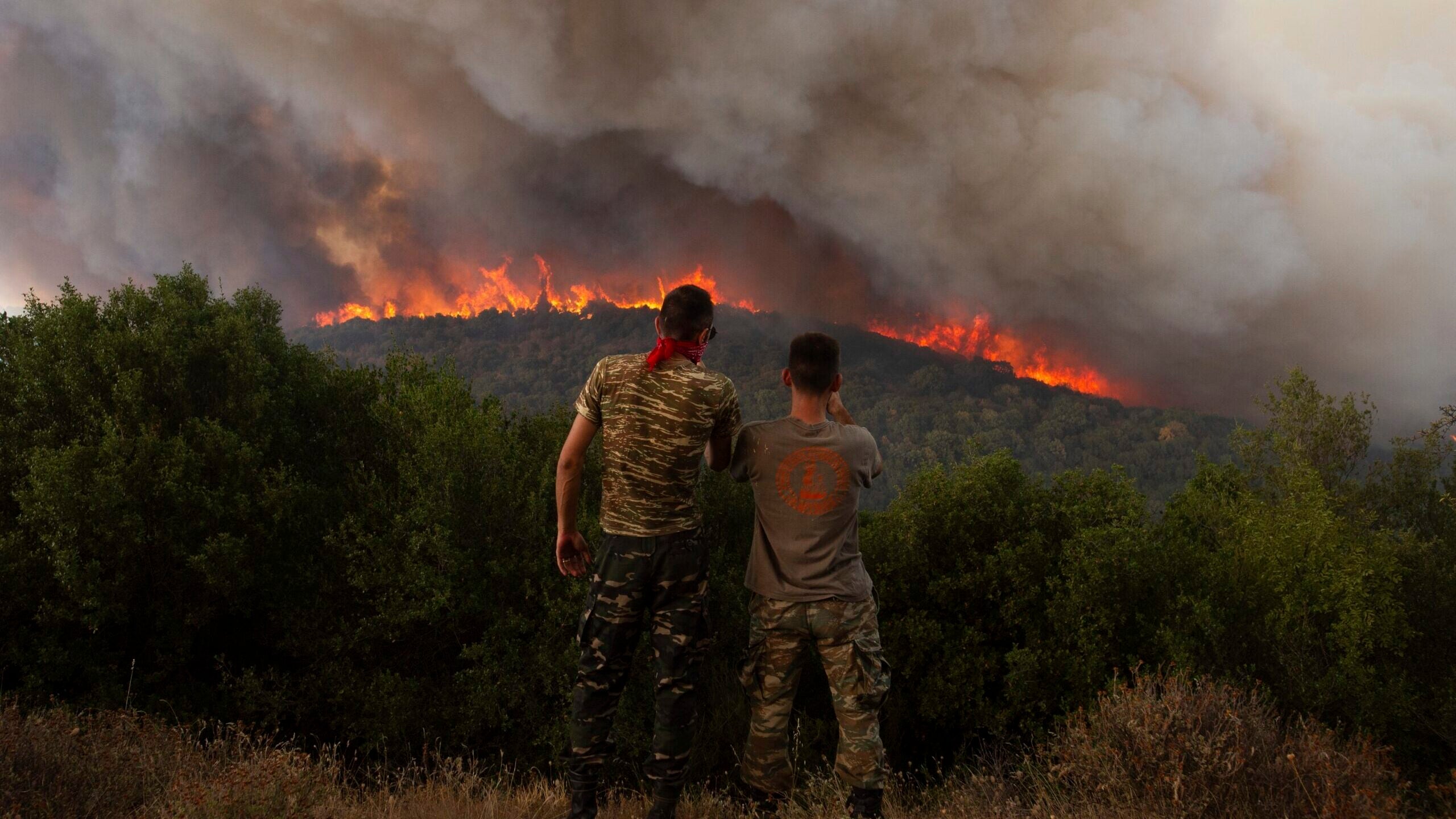Firefighters in Greece struggle to control wildfires, including the EU’s largest blaze
ATHENS, Greece (AP) — Firefighters struggled Thursday against strong winds and hot, dry conditions to tame multiple wildfires ravaging Greece, including one in the country’s northeast that officials say is the largest recorded in the European Union.
The wildfires have left 20 people dead over the last week. Eighteen of those, including two boys aged between 10 and 15, are believed to be migrants who crossed the nearby border with Turkey. Their bodies were found near a shack in a burnt forest area near Alexandroupolis in northeastern Greece. Sixty firefighters have been injured, fire department spokesman Ioannis Artopios said.
The wildfire in the Alexandroupolis region, burning for a sixth day, combined with smaller fires to create a massive blaze that consumed homes and vast tracts of forest and triggered multiple evacuations of villages and of the city’s hospital.
With more than 730 square kilometers (282 square miles) burned, the Alexandroupolis blaze was the EU’s largest on record, European Commissioner for Crisis Management Janez Lenarcic said on X, the social media platform formerly known as Twitter.
“We must continue strengthening national & collective prevention and preparedness efforts in view of more brutal fire seasons,” he tweeted.
Elsewhere in Europe, fires in Spain’s Canary Islands and northwestern Turkey were being brought under control, officials said.
Firefighters in Greece tackled 104 fires across the country in the 24 hours between Wednesday and Thursday evening, 69 of which were new wildfires, the fire department said.
One of the major blazes was on the outskirts of the Greek capital, where flames scorched homes on Wednesday and burned into the national park on Mount Parnitha, one of the last green areas near Athens. By Thursday night, the situation appeared somewhat improved, although firefighters were still dealing with flare-ups, the fire department said.
Greece’s Climate Crisis and Civil Protection Minister Vassilis Kikilias said arson was to blame for some of the blazes near Athens.
“Some … arsonists are setting fires, endangering forests, property and above all human lives,” Kikilias said in a televised statement. “What is happening is not just unacceptable but despicable and criminal.”
The minister said nine fires had been set in the space of four hours Thursday morning in the area of Avlona, in the northern foothills of Mount Parnitha.
“You are committing a crime against the country,” Kikilias said. “We will find you. You will be held accountable to justice.”
Police on Thursday arrested a 45-year-old man on suspicion of arson for allegedly setting at least three fires in the Avlona area. A search of his home revealed kindling, a fire torch gun and pine needles, police said.
With firefighting forces stretched to the limit, Greece has asked other European countries for assistance. Germany, Sweden, Croatia, Cyprus sent aircraft, while dozens of Romanian, French, Czech, Bulgarian, Albanian and Slovak firefighters have been helping on the ground.
Artopios, the Greek fire department spokesman, said 260 firefighters, including more than a dozen from France, battled the Parnitha fire supported by 10 planes and 11 helicopters. Bulgarian, Albanian, Romanian and Czech firefighters with vehicles were helping in the Alexandroupolis fire.
Greece suffers destructive wildfires every summer. The deadliest killed 104 people in 2018 in a seaside resort near Athens that residents had not been warned to evacuate. Authorities have since erred on the side of caution, ordering evacuations whenever inhabited areas are under threat.
In 2007, a series of devastating wildfires that affected mainly the southern Peloponnese region killed more than 70 people by the end of that summer and burnt around 2,700 square kilometers (1,040 square miles).
Last month a large wildfire on the resort island of Rhodes forced the evacuation of some 20,000 tourists. Days later, two air force pilots were killed when their water-dropping plane crashed while tackling a blaze on the island of Evia.
With their hot, dry summers, southern European countries are particularly prone to wildfires. EU officials have blamed climate change for the increasing frequency and intensity of wildfires in Europe, noting that 2022 was the second-worst year for wildfire damage on record after 2017.
In Spain’s Tenerife, a fire that has scorched 150 square kilometers (58 square miles) was being brought under control.
Canary Island regional President Fernando Clavijo said Thursday the blaze had “not gained a single square meter” for the first time in over a week. Of the 12,000 people forced to evacuate their homes earlier in the week, only about 200 were still unable to return.
In Turkey, firefighters in the northwestern Canakkale province brought a wildfire under control Thursday, less than 48 hours after it erupted amid high temperatures and strong winds, Turkish Forestry Minister Ibrahim Yumakli said.
Yumakli said the fire, which had forced the evacuation of 11 villages, had affected 40 square kilometers (15 square miles) including 14 square kilometers (5.4 square miles) of agricultural land.
A firefighting volunteer who was injured and six other people who suffered from smoke inhalation were being kept under observation in hospitals, Yumakli said.
“We are extremely happy that there was no loss of life,” Yamukli said. “However, we are heartbroken for other creatures of the ecosystem that were affected.”
Shipping traffic through the Dardanelles Strait, a major maritime thoroughfare linking the Aegean Sea with the Sea of Marmara, was being partially restored to one lane only, after being completely suspended as fire-dousing aircraft use the waterway to pick up water.
Suzan Fraser in Ankara, Turkey and Raf Casert in Brussels, contributed.
